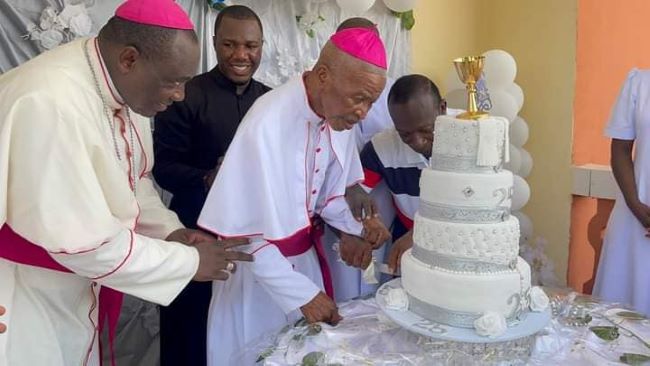Categories
Recent Posts
- Football: Joselu inspires Madrid comeback with ‘heart’ to beat Bayern
- il y avait quoi avant: Camair-Co continues to buckle under debt pile
- FECAFOOT Crisis: Eto’o refuses to sign contract of government-appointed coach
- Manyu Traditional Rulers Association and Mgbe: Wisdom and Knowledge of Jurisdiction is Fundamental
- Hummels stuns Mbappe and PSG to take Dortmund to Champions League final
Archives
- May 2024
- April 2024
- March 2024
- February 2024
- January 2024
- December 2023
- November 2023
- October 2023
- September 2023
- August 2023
- July 2023
- June 2023
- May 2023
- April 2023
- March 2023
- February 2023
- January 2023
- December 2022
- November 2022
- October 2022
- September 2022
- August 2022
- July 2022
- June 2022
- May 2022
- April 2022
- March 2022
- February 2022
- January 2022
- December 2021
- November 2021
- October 2021
- September 2021
- August 2021
- July 2021
- June 2021
- May 2021
- April 2021
- March 2021
- February 2021
- January 2021
- December 2020
- November 2020
- October 2020
- September 2020
- August 2020
- July 2020
- June 2020
- May 2020
- April 2020
- March 2020
- February 2020
- January 2020
- December 2019
- November 2019
- October 2019
- September 2019
- August 2019
- July 2019
- June 2019
- May 2019
- April 2019
- March 2019
- February 2019
- January 2019
- December 2018
- November 2018
- October 2018
- September 2018
- August 2018
- July 2018
- June 2018
- May 2018
- April 2018
- March 2018
- February 2018
- January 2018
- December 2017
- November 2017
- October 2017
- September 2017
- August 2017
- July 2017
- June 2017
- May 2017
- April 2017
- March 2017
- February 2017
- January 2017
- December 2016
- November 2016
- October 2016
- September 2016
- August 2016
- July 2016
- June 2016
Featured
Most Commented Posts
 4 Anglophone detainees killed in Yaounde
4 Anglophone detainees killed in Yaounde
19 comments Chantal Biya says she will return to Cameroon if General Ivo Yenwo, Martin Belinga Eboutou and Ferdinand Ngoh Ngoh are sacked
Chantal Biya says she will return to Cameroon if General Ivo Yenwo, Martin Belinga Eboutou and Ferdinand Ngoh Ngoh are sacked
13 comments Anglophone Nationalism: Barrister Eyambe says “hidden plans are at work”
Anglophone Nationalism: Barrister Eyambe says “hidden plans are at work”
12 comments The Anglophone Problem – When Facts don’t Lie
The Anglophone Problem – When Facts don’t Lie
12 comments Largest wave of arrest by BIR in Bamenda
Largest wave of arrest by BIR in Bamenda
10 comments
Latest Tweets
Featured
-

Football: Joselu inspires Madrid comeback with ‘heart’ to beat Bayern
-

il y avait quoi avant: Camair-Co continues to buckle under debt pile
-

FECAFOOT Crisis: Eto’o refuses to sign contract of government-appointed coach
-

Manyu Traditional Rulers Association and Mgbe: Wisdom and Knowledge of Jurisdiction is Fundamental
-

Hummels stuns Mbappe and PSG to take Dortmund to Champions League final
-

US brands Israel border closures ‘unacceptable’
-

Asylum seekers in UK ‘hide or flee to Ireland’ for fear of deportation to Rwanda
© Cameroon Concord News 2024





4, August 2022
When God Refuses to Speak: Random Thoughts of a Simple Christian- In Memoriam, Fr. Didimus Nformi 0
Tuesday July 19 began like any other day in Boston. After the usual early morning standing appointment with God, I embarked on the chores of the day, mainly, academic work. Around mid-morning. Everything changed. The news came that Fr. Didimus Nformi YOMBO was no more! He had died in a ghastly accident on his way to Buea, after procuring his study visa at the US Embassy in Yaoundé. At first, I thought it wasn’t true. This could not be true. He was supposed to be in Boston in August. Everything was ready for him to begin his graduate studies at Boston College. How could this be?
I met Didimus while attending a wedding in Buea in January of this year, and again in February, after the Ratzinger Conference at CATUC, Bamenda, when we stopped over in Buea on our way to the airport to visit with Bishop Bibi. He came across as very welcoming, humble and unassuming, eager to make a visitor feel at home. And I remember saying to him while leaving Small Soppo, see you in Boston and hope that you study Ratzinger when you come to Boston College! He smiled. I guess that was a mortal’s wish! After all, I am just a man, limited by finitude. A creature. It was never to be! How could I have known! Boston was never to be enriched by the presence of Didimus, a young priest, gone too soon, I would say, and under very painful circumstances.
I spent much of the day in the chapel, just staring at Jesus in the Tabernacle. Praying the breviary felt dry. No emotions. No words could express anything. Just staring at the Tabernacle was all one could do, in utter shock. I asked Jesus countless times: Why, Lord? What does this mean? What value is his death to you? Did you think of this young man’s mother? And many other questions. It was a Job-like experience, and like Job, I am not sure the Lord answered me. Perhaps I was talking to myself and not to Him. But I was in His presence. He was there. He is always there, present in the Most Blessed Sacrament. How could He not be there? He has been a Prisoner of the Tabernacle for over 2000 years. How could you be, Jesus, and you allow such a thing to happen to a young priest of yours? Why place such a promising future before him, and then not give him the opportunity to pursue it? Why show David that he is going to become king, only to leave him as a shepherd for the rest of his life? Does not Scripture say that hope deferred makes the heart sick? (Proverbs 13:12). Are you really there, Jesus, and yet are allowing such pain in the world?
At one point, my thoughts went to the question of the non-existence of God in the Summa of Aquinas. Two objections stand out supporting the non-existence of God, for Aquinas: divine omnipotence (God is all powerful), and divine omnibenevolence (God is all good). If God is all powerful and all good and yet, there is evil in the world, then we are left with a scenario of two alternatives: either God is all powerful and yet not all good because he allows for evil to inflict the world; or, God is all good but not all powerful, again, because of God’s inability to stamp out evil in the world. And the dilemma that Aquinas raises is captured by Dostoevsky The Grand Inquisitor in more stark terms: Ivan rejects or rebels against God, attempting to persuade his believing brother Alyosha, that God’s ordering of creation and Christ’s redemption are basically ineffective, based on a simple premise: God has been unable to free the world of suffering, pain and evil. Aquinas’ resolution of the impasse between Divine omnipotence and omnibenevolence leaves Ivan unpersuaded.
My thoughts further pondered Vatican II’s description of death in the Pastoral Constitution on the Church in the Modern World, Gaudium et Spes: it is when faced with death that the human being is most caught up in doubt. Human beings are tormented by the thought of their ceasing to be, and rightfully so (Gaudium et Spes, 18). And there is an underlining reason for the fear of death, as Ratzinger points out in his treatment of Eschatology, namely, the state of incommunicability regarding the foundation of human existence, that is, love. In death, we are unable to respond to love. We enter into a state of aloneness. And this, to Ratzinger, accounts for the excruciating pain that characterizes death.
Caught up in these thoughts, it occurred to me that though I had spent a good deal of time in the silence of the chapel, God wasn’t going to provide an explanation to me regarding the painful passing of Didimus. Perhaps like Job, even if God spoke, He was going to bully me into silence by posing questions that a finite mind like mine wouldn’t be able to answer. Or maybe God’s silence was his speech. He had done it before. This was not the first time that God was staying silent in the face of death. He did same one Friday afternoon on a hill outside Jerusalem called Calvary. And history is repleted with examples of God staying silent when one would have loved him to say a word. I think of the death of my own sisters, late twenty and early thirty in age, two years apart. God stayed silent. And other sufferings over the years, such as when a young child dies! Or when a young child is suffering from so much pain, hospitalized! God appears to always stay silent when we would need him to speak. Again, could God’s silence be God’s speech? Or maybe God knows that speech in such circumstances cannot resolve anything.
Perhaps the best God can do in the situation of the tragic death of Didimus is just God’s presence. He had promised in the revelation of His Sacred Name to Israel – Ehyeh Asher Ehyeh (Exodus 3:14) – I will be with you in the manner in which I will be with you. Perhaps Buber and Levinas were right after all: the Tetragrammaton was not, in the first place, about being, ontology or metaphysics. It was about presence: God will be present with Israel. God will be present with us, in life and in death. And precisely that presence, even if He does not speak, leaves the possibility for hope open. God is present, even when God does not speak. I am not alone. And so, God is presence, because God is being. That is the Ratzingerian synthesis: being and presence are not antithetical.
Like Job and like Jesus, we end where we began: God has refused to speak. God has refused to answer. God has refused to take the witness stand to provide me an explanation for why Didimus had to go so soon in such a painful way. And yet God is not nothing. God is there. Perhaps, with Newman, I could only console myself with these thoughts: “God has created me to do Him some definite service; He has committed some work to me which He has not committed to another. I have my mission. I may never know it in this life, but I shall be told in the next. I am a link in a chain, a bond of connection between persons. He has not created me for naught. I shall do good; I shall do His work (…) Therefore, I will trust Him. Whatever, wherever I am. I can never be thrown away” (St. John Henry Newman). We must learn to live with God’s silence. May the soul of Didimus, priest of God, rest in the peace of the Silent God, Amen. May he pray for us who are still on the way. See you, Fr Didimus, in the heavenly Boston College. We will discuss theology there, with Augustine, Aquinas, Bonaventure, and other great minds, not leaving out your patron saint, St. Didimus the Blind (c. 318 – 398), Dean of the Theological School of Alexandria, disciple of Origen of Alexandria.
By Fr Maurice Agbaw-Ebai